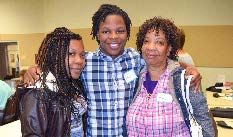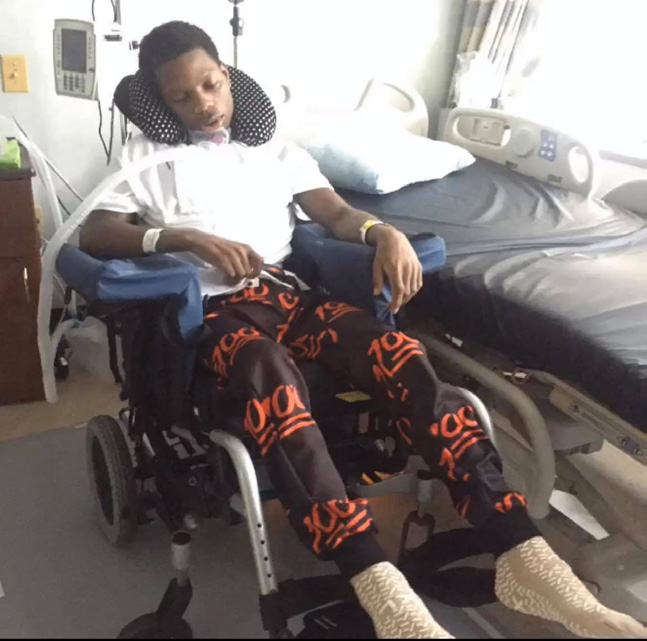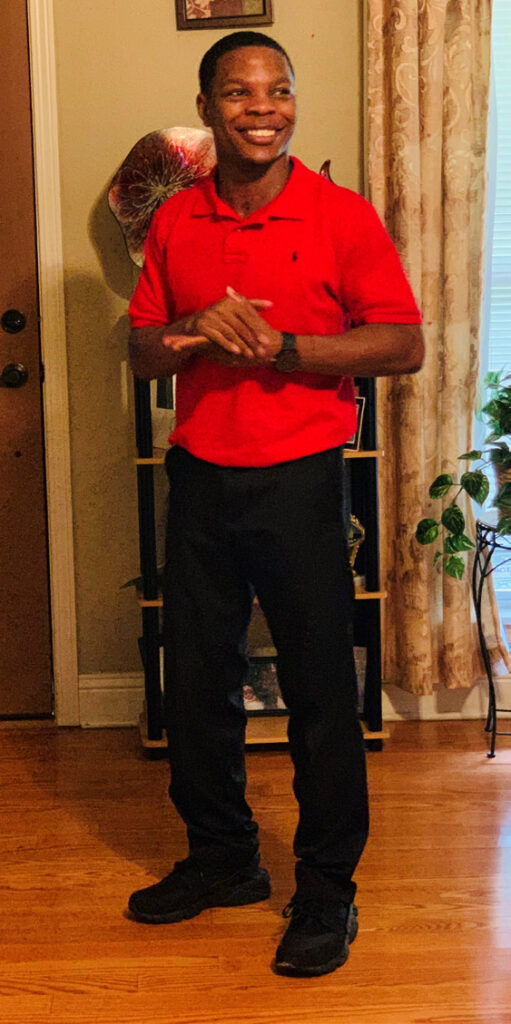Ask the Specialist: Boosting Cognitive Health After TBI
By Chrystal T. Fullen, Psy.D

Department of Psychiatry
University of Arkansas for Medical Sciences
Most brain injury survivors struggle with cognition (thinking abilities such as attention, learning and problem solving) after a TBI, especially with moderate and severe TBI.
Although the brain has an expected period of recovery, multiple strategies exist to boost your cognitive health at home:
- Prioritize REST! After a head injury, your brain needs time to heal. Make sure you are getting enough sleep and taking breaks during the day.
- Exercise. If you are able, add in cardiovascular activity, like simply taking a daily short walk.
- Don’t neglect emotional health. Increased anxiety and depression are common after TBI. Manage your stress and if necessary talk to your doctors about treatment options.
- Stimulate the brain. Just like the body, the brain needs exercise. Do interesting things you enjoy to avoid being bored (e.g., listening to music, reading, playing word games, socializing with friends).
- Recovery takes time. Consider gradually increasing your activities by avoiding taking on too many responsibilities. Instead, start with simple chores (e.g., laundry). Once this is easier to manage, add in more challenging tasks (e.g., scheduling appointments).
- Train your attention. After a head injury, survivors struggle with things like paying attention for a long time and multi-tasking.
- Set yourself up for success by:
- Getting good at concentrating on one thing at a time before trying to multi-task.
- Doing daily mindfulness exercises to improve focus.
- Decreasing distractions: Remember, distractions can be internal (e.g., pain, negative thoughts) and external (e.g., phone, noise).
- Set yourself up for success by:
- Structure your environment. This will help your ability to get through larger tasks and support any memory problems you may have.
- No matter the task, try to plan (e.g., preparing a meal, getting ready for an appointment)
- Take notes to provide reminders.
- Get help with organizing your space.
- Avoid activities or substances that can put you at risk for an additional injuries (e.g., reckless behaviors, alcohol use).
If you are having significant problems with thinking abilities, talk to your doctors about a referral for cognitive rehabilitation.
Want to suggest a topic? Email us at braininjury@uams.edu.
TBI Survivor Story: Keith Handcock
As Told to Karmen Robinson
“If you don’t like something, change it. If you can’t change it, live with it.”
Keith Handcock

People often make resolutions to kick off the new year, but at 18 years old, Keith Handcock woke up from a coma on New Year’s Day in 2016, marking the start of a tough, yet rewarding, journey ahead.
On Oct. 30, 2015, five months after graduating from Conway High School, Keith headed out the door to run an errand for his mother, who wasn’t feeling well. As he hopped in his new car –a graduation gift from his grandmother – he used his phone’s navigation system to plug in the address to a family friend’s
house, so he could pick up a couple items for his mother.
“My GPS wasn’t talking to me, so I had to look down to read the directions,” said Handcock, now 24. “By the time I looked up, I was drifting to the right and off the road.”
In a panic, he attempted to straighten the car to avoid crashing into the woods. He yanked the steering wheel to the left but ended up overcorrecting, causing the tires to lose traction as the car spun out of control.
The car eventually went airborne until finally hitting a tree. Keith was only four minutes away from home. Keith wore his seatbelt, which secured him in the driver’s seat during the accident, and EMS removed Keith, unconscious, from
the car.
From there, he was airlifted to Baptist Health Medical Center, where he remained in a medically-induced coma for over a month, followed by an additional month-long semicoma. Nearly two months after the accident, Keith was transferred to Timber Ridge NeuroRestorative in Benton on Dec. 29, waking up from his coma just three days later, on New Year’s Day.
“After waking up and seeing what happened to me, I was terrified when I heard that I had a traumatic brain injury because I didn’t know what it was,” he said. “I was scared.”
He was diagnosed with a diffuse axonal injury. This type of traumatic brain injury occurs when the brain rapidly shifts inside the skull, causing severe nerve damage.
“I could only look around. I couldn’t make a sound, and I couldn’t even smile,” said Keith, known for his big smile and sense of humor. “That was kind of depressing because I couldn’t do anything. All I could do was rely on my family.”
Miraculously, he didn’t have any other injuries to his body, but his road to recovery was challenging. Before his accident, he played sports and was accustomed to healing quickly. However, recovering from a TBI would take a bit longer than he expected.
“I learned to take it one day at a time, and one step at a time,” he said. “I had to relearn how to walk, talk and shower — basically, I had to relearn how to do every single thing.”
While at Timber Ridge, his motivation to recover stemmed from his gratitude of waking up again. He saw patients who never came out of their comas as well as those who struggled to progress due to the severity of their traumatic brain injuries.
“I said to myself ‘I’m going to do it for them.’ They didn’t get the chance to come back, so since I got a chance, I’m going to come back,” Keith said.
“And nobody is going to tell me that I’m not.” His drive is easily noticeable, and he stresses the importance of having a strong work ethic to achieve goals, even if those goals may seem insurmountable in the beginning.

“I would always ask my physical and speech therapists what I could do in my free time. I feel like I made so much progress with my voice, my walking and my physical appearance because I worked so hard,” he said.
“You have to put in that work. If you really want something, you can’t just work out in physical therapy, you have to work out outside of physical therapy.”
Keith continues to work out six days a week and still goes to physical therapy every Wednesday to reach his ultimate goal of running again.
Determined to improve daily, he also attends local support group sessions, working with TBI specialists, including UAMS associate professor Rani Lindberg, M.D. Additionally, he stimulates his mind through various activities, like learning Spanish and playing chess.
“Playing chess, I have to think before every move I make, and I realized that helped me,” he said. “I felt that would translate to every decision I make.”
Keith said his accident also enhanced his personal relationship with God. “I was already religious before my accident, but I was super religious after it,” he said. “When my family would leave and I was alone at Timber Ridge, God was the only one I could call on.”
He relied heavily on Bible scriptures to keep his spirits up, referring to Luke 11:10 in particular. “Whoever asks, receives. Whoever seeks, finds. Whoever knocks, the door will be open,” he said, reciting the verse from memory.
“When I was in rehab, I was knocking, I was banging,” he said as he laughed. “But I had to learn to love and trust the process.”
Almost two years after the accident, he was discharged from Timber Ridge in September 2017. Initially, he struggled to adjust to his new life at home, and with frustration, he would occasionally lose his temper – an issue he never had before the accident.
“My mama didn’t play that mess,” he said, laughing again. “It was pretty rough for my family because even though I had a positive outlook on life, my temper was outrageous,” he said. “But when I would calm down, I remembered what I did, the way I shouted and what caused it, but I know it’s not me, so I always apologized.”
To cope with “this traumatic brain injury life”, as he refers to it, he decided to develop a new self mantra to accept change and move forward. “If you don’t like something, change it. If you can’t change it, live with it,” he said. “Living with something means finding peace. No hate, no complaining. Peace.” He’s learned to live with his traumatic brain injury. In fact, he loves it.
“I always considered myself different. Now I live a brain injury life that no one really knows about. They can’t tell you what to expect,” he said. “I feel different, but I like it. I know it sounds crazy, but I like it.”

In addition to the hurdles he’s overcome, Keith has even surprised himself with some of his accomplishments. Serving as an inspiration to others, he’s written and published two books and hopes to become a motivational speaker. He decided to write them at the suggestion of his therapist.
“If you were to tell me in high school that I would write two books, I would have laughed,” he said with another chuckle. His first book, “A Setback Setting Up for a Major Comeback,” was published in 2019. He published his second book in 2020 called “From Setbacks to Comebacks: Don’t Try It Alone!”
As someone who also loves working with his hands, Keith plans to enroll in auto mechanic school in the near future, believing anyone can accomplish their goals as long as they “put in that work.”
Keith’s Tips for Brain Injury Survivors:
- Have Faith
- Don’t be afraid to put in “that work” to achieve your dreams.
- Ride your own wave—be steadfast in what you believe in.
- The first year or two after waking up from my coma, I told myself, “just because you’re handicapped, it doesn’t mean you have to act handicapped.” Meaning, do what you can.
Want to share your story? Email us at braininjury@uams.edu.
Social Security Pointers: Choose A Representative Payee for Social Security Before You Need One
By Phylis Dills, Social Security Public Affairs Specialist
The future is uncertain. Our Advance Designation program allows you to pre-select a trusted individual if a time comes when you need a representative payee to help manage your money. Advance Designation enables you to identify up to three people, in priority order, whom you would like to serve as your potential representative payee.
We recently celebrated the one-year anniversary of our Advanced Designation program. Since its launch in March 2020, more than one million eligible individuals have opted to participate.
You may choose an Advance Designation if you are capable of making your
own decisions and are:
- An adult or emancipated minor applying for benefits and do not have representative payee.
- An adult or emancipated minor beneficiary/recipient and do not have representative payee.
You can submit your Advance Designation information when you:
- File a claim for benefits online.
- Use the application available in your personal my Social Security account at www.ssa.gov/myaccount.
- Call us by telephone at 1-800-772-1213 (TTY 1-800-325-0778).
In the event that you can no longer make your own decisions, you and your family will have peace of mind knowing you already chose someone you trust to manage your benefits.
We have updated our Frequently Asked Questions to answer any questions you may have about Advance Designation at www.ssa.gov/faq under “Other Topics.” You may also find more information about representative payees on our blog at blog.ssa.gov.
Please be aware that past newsletter issues may contain outdated information. For the latest updates on resources and events, visit our website or contact us at braininjury@uams.edu with any questions.
